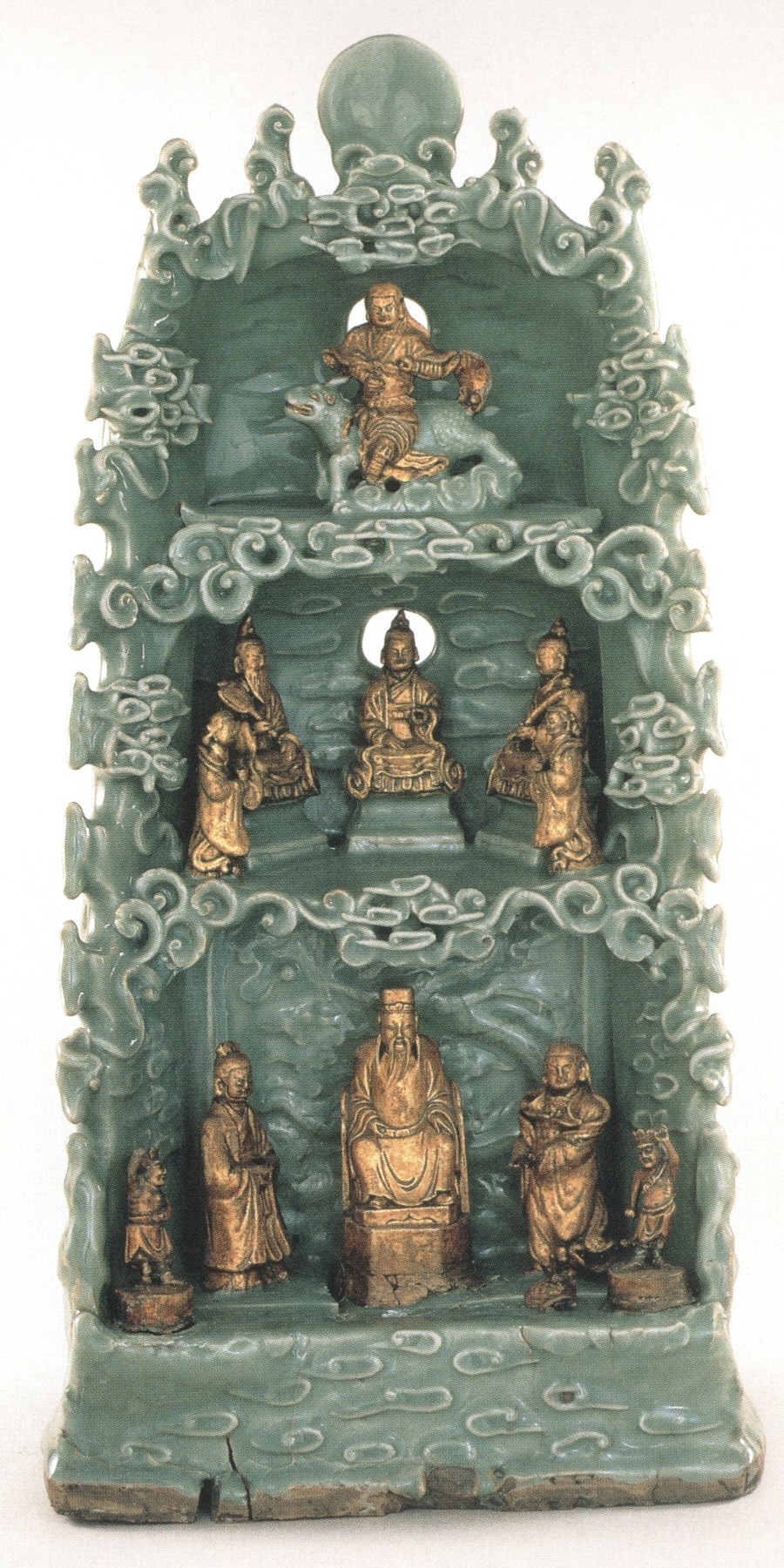#zhenwu
Link
When we talk about Chinese martial arts now, we often mean immersion in mythological space. It is already a well-established cultural phenomenon. However, historically, martial arts have been magical from the very beginning. For ex., the Chinese sword (jian) has always been (and still is in modern Taoist schools) a magical and later ritual feature. It has even been used as a kind of voodoo doll perceived as a living (and godlike) being, if necessary, able to replace the owner.
#ancient china#chinese sword#chinese swordsmanship#zhenwu#xuantian shangdi#taoist magic#chinese mythology#jian
62 notes
·
View notes
Text
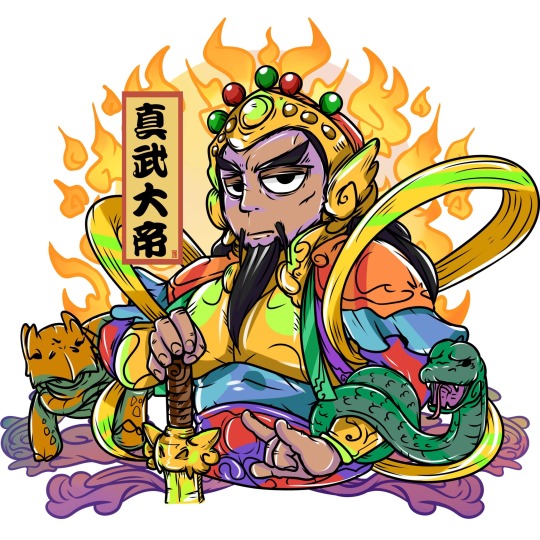
西遊記-
93-Zhenwu 真武大帝/ Xuanwu 玄武
7 notes
·
View notes
Text
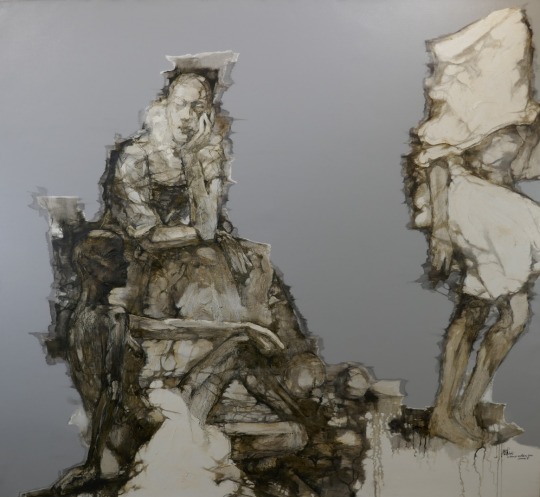
Liao Zhenwu (Chinese, b. 1964)
Time Tag no.7, 2007
Acrylic on canvas
107 notes
·
View notes
Note
I'm technically a day late but Happy Qixi festival! Does Shambhala have the Qixi festival? It's connected to the cowherd and weaver girl so I'd imagine yes?
If so, what would Fei/Hai do to celebrate? Something super cheesy and sweet? How about the other couples from Omi's family? Can we get some cute happy funny stories/headcanons from back when they were still, uh... alive and being cute and happy and funny?
Oh! I didn't even realize til you pointed it out, anon! Happy belated Qixi Festival! And yeah, I definitely think that they have their own version of the festival!
I think the festival is something celebrated village-wide. Basically a big old party celebration where newlyweds and longtime couples alike celebrated their love. Because of their unique version of the Cowherd and Weaver Girl story, I think they have some traditions unique to the village. One of which being sort of a couples walk. Two volunteers stand on either side of Mazu River, holding a rope between them. Then one of the couple will cross through the river to the other side, where their partner is waiting with a towel to dry them off. Sort of symbolic of the journey the Cowherd took every year to meet the Weaver Girl, and how the Weaver Girl took care to greet and thank her husband for making the journey to see her. Another common game done for fun in Shambhala is that married women will set out pieces of their embroidery work and see if their husbands can discern which ones their wives made. It's not an especially serious competition, and it's not uncommon for the wives to play jokes on their husbands by copying the embroidery styles of their friends to dupe them into picking the wrong ones on purpose just to razz them.
Pretty common in the village for people to give the women and girls of their families hair accessories and combs, or toys for the younger girls. For the men it's common for them to be given alcohol (for the adults) or toys (for the boys), though it's also not uncommon for some of the older end of the boys on the scale to be snuck a sip or two of the alcohol for the occasion. Unmarried couples will usually give each other black chicken feathers (natural or dyed) as gifts, representing magpie feathers.
Qiaoguo is a common treat. A lot of fish shapes, but birds are another common image for the treats because of the magpie part of the story. Lots of fresh fruits are shared on the occasion, a regular unofficial festival game ends up being a competition where people see how far they can spit the fruit seeds (Omi's great grandma Lien is the longest running unbeaten record holder in the village).
One year when they were teenagers, two of the rope holders were Fei's friends, and he concocted a plan to impress Hai by having them hold the rope taut so he could tightrope walk across the river. He got halfway across before he stumbled headfirst into the river, splashing Hai in the process. But instead of getting mad when he made his way sheepishly to shore, she just tackled him into the river and splashed at him playfully. That year the tradition turned into a water fight, but no one was particularly mad about it.
Back when they were younger, Boqin and Lien would end the night's festivities by slipping away so they could watch the stars together up on the mountain. Instead of the usual gifts, Lien would make him scarves and hats so he wouldn't be too cold when he went up in the colder months to stargaze. Boqin, who's a dab hand at whittling, would carve wooden combs and hair accessories for her that looked like snowflakes.
No matter how hard she tried to trick him, Zhenwu has never once failed to recognize which needlework was Shui's in that particular festival game.
The first time Xi and Dasao tested out the wheelchair they made for him in public was at one of the festivals. One of the wheels ended up cracking due to a miscalculation on its construction, but they still had a good time together, with Dasao helping him around by carrying him. And they were right back to working on it again the next day to make sure that didn't repeat itself.
Shancai and Longnu kept the last gifts Dandan and Niu ever gave each other during the Qixi festival. They made sure to put them onto their shrine every year so the two can join them in spirit.
Erniang's first ever gift to Qing during a Qixi festival was a flower crown, because her original gift idea ended up not working out. It ended up being a tradition between them in the end, with him picking her a bouquet of flower and her making a crown to give him when he gave her the bouquet.
#asks#ocs#youre okay#sun hai#sun fei#liu boqin#daci lien#sun zhenwu#pan shui#sun xi#gu dasao#daci shancai#wang longnu#xia dandan#liu niu#sun erniang#zhang qing
2 notes
·
View notes
Text
LMK S5 trailer, Chinese pantheon infodump, and some ideas
…Man, normally, I feel the urge to write fix-it AUs after rewatching episodes and coming across particularly bizarre theories and takes, not before the new season's even out.
Thanks, S5 trailer.
Consider this your spoiler warning, because the rest of this post will all be my personal opinions about a few major story beats that were revealed + the rough outline for a fix-it AU.
It's also a bit ranty, and features some criticisms of the general narrative, so if that's not your cup of tea, feel free to avoid this one.
Li Jing becoming JE/the regent of the Celestial Realm is just hilariously absurd. I mean, it makes a teeny tiny bit more sense than the "Nezha will be the new JE" fan theory, but that's not a very high bar.
1) In-universe, he had done a grand total of nothing while shit was hitting the fan, and only showed up after it was all over. Which, tbh, isn't too far from his role in FSYY. No, wait, at least in FSYY, he killed Luo Xuan via a pagoda to the head, after the guy had all his fire-based magical treasures neutralized and taken away by Princess Longji.
Yeah, congrats, LMK's Li Jing, you've somehow become even more useless than your FSYY and JTTW counterparts——which is a true feat.
2) Even if someone's making him JE/regent, it wouldn't be the Ten Kings. To put it simply: the Underworld doesn't have that authority. They are the most pathetic of all divine bureaucracies, who pretty much only show up to get pushed around and revive the occasional dead guy in JTTW (and I still love them).
Like, they ain't no Hades or Satan. Just the 10 judges of the Dead People Supreme Court. To heavily paraphrase Di Ting in the original JTTW novel:
"How much power do Underworld gods really have? (幽冥之神,能有多少法力)"
"...Certainly not enough to stop a rampaging demonic macaque who's as strong as SWK, if I say the truth out loud in here and piss him off. Just send them to the Buddha, please."
An analogy: if the Celestial Host is the imperial court, the Underworld is the ministry in charge of judicial processes and prisons. They don't even have authority over the imperial censors who answer directly to the emperor, let alone the power to determine a successor to the throne during a major crisis.
If this was to make the tiniest bit of sense, Li Jing would be the one commanding THEM, not the other way around. Or if it's Bodhisattva Ksitigarbha himself giving orders to Li Jing…for some reason.
But we know that ain't happening bc of the show's strange aversion to showing Buddhist deities on screen, not to mention it would be very OOC for Ksitigarbha, whose job is granting relief and salvation to souls in the Path of Hell, not judging and punishing them like the Ten Kings.
3) If you must make Li Jing the emperor/regent, you have a more mythos-accurate and obvious choice than the Ten Kings, considering you already got the Four Divine Beasts involved!
Yes, I'm talking about their bosses, the humanoid "directional + elemental gods": Lord Father of the East (Wood), Queen Mother of the West (Metal), Emperor Zhenwu of the North (Water).
No South though...because our mythos can't agree on a single directional god of the South, but for shit and giggles, just imagine Zhurong, Yandi, Huaguang, and the Star of Fiery Virtues all sitting on the same narrow bench, staring awkwardly at each other.
Maybe we can have Ziwei, Great Emperor of the Central Sky and North Stars, who is one of the Four Sovereigns(四御) in Daoism (two of which could also be an alternate choice, but maybe a bit too obscure for foreign audiences).
He commands the stellar deities and heavenly bodies——which the Four Divine Beasts would technically fall under, as guardians of the four quadrants of the sky, each in charge of 7 Lunar Mansions.
4) But if you already have these deities, why the hell would any of them make Li Jing the regent? Wouldn't it be more likely for them to create a Celestial Council of Regents themselves, with Devaraja Li Jing under their command as the leader of what's left of the celestial army?
Like, you can still have them, or one of them, going after the gang and ordering Li Jing to put the fillet on SWK.
I can see Zhenwu the Demon-Vanquisher doing that, since the fillet isn't too different from what he did to Huaguang and a lot of the demons he subdued in JTTN: feeding them magical water/fire pills that would corrode/ignite their insides whenever they tried to resist.
(Yeah, compared to that, the fillet would look like the lenient option, since it's just pain and won't actually dissolve/cook you alive from the inside out...)
And it wouldn't be bc he thought SWK was to blame for the Brotherhood's epic fuck-up...somehow. Like, what even is that logic?!
I mean, I can kinda see the Ten Kings doing it as a pre-emptive "Don't blame us for our shitty security, blame that guy over there!" move...except they are no longer answering to any higher authorities who'd hold them responsible at that point!
"What about Li Jing?" You may ask. Yeah, WHAT ABOUT LI JING? Why does Li Jing have to get involved in this?
If he's forcing the Ten Kings to pass judgement on the gang (which surely doesn't look like it in the trailers), why's he enlisting the help of the weakest faction and not, y'know, his celestial soldiers and other gods?
If the Ten Kings get Li Jing to be their enforcer...well, how the Eighteen Hells did they manage that? What could the Ghost Supreme Court and their crappy prison-torture chamber-soul customs office complex even offer Li Jing as a bribe?
And if their goals were to avoid responsibilities by blaming someone else, how stupid did they have to be to actively involve/create a higher authority who can punish them once the cat gets out of the proverbial bag, instead of, I dunno, just stay where they are and keep their head down???
So in my fix-it AU, it's more of a "Better safe than sorry" scenario, where every demon working for the new Celestial Council must prove their loyalty via swallowing the water/fire pill, now that even more dangerous demons have escaped and are running around in the aftermath of S4.
And Great Sage and company are not exempt from that new law either——"If you are truly righteous and Not Like Them and not planning to rebel, what's there to be afraid of?"
Horrified by the Demon-Vanquishing Mansion's 16th century standards of "justice" and "mercy", they naturally would not have any of it, and thus the conflict begins.
Not only would this show the fallout of Azure's misguided rebellion——that, in trying to make a better world, he had made it 120% worse for both humanity and demonkind in less drastic and more realistic ways aside from dooming reality to irreversible destruction, it would also help with the major show-not-tell problem about Celestial cruelty bc the "good guys" in power saw no problem with this kind of shit.
If you want your lawful antagonists who take Order to its extremes, the warrior sovereign in black leading an elite army of demon-hunters + penal legions made of "reformed" demons would be a better choice than the Ghost Supreme Court, don't ya think?
(Fun fact: in Zaju plays, Zhenwu was often said to be the boss of Nezha and Erlang, so him commanding Li Jing wouldn't be too out of place either.)
Now, you may ask, why do I even care? After all, isn't it clear that the show is neither mythos-accurate nor trying to be, considering the JE got K.O.ed by a Bodhisattva's cat of all things?
Not to mention the season's not even out yet, so why jump to conclusions so quickly? Maybe the actual episodes will have explanations that make sense. Relax.
...Cause I don't mind less-than-stellar animations if the story's good, and since I keep noticing the less-than-stellar animations, it clearly isn't good enough.
Also, it's not like it's only the implications that are absurd——my problem is with the whole premise of "Li Jing becoming the new JE/Regent" and "The gang is prosecuted by the Ten Kings for bullshit reasons, even though these guys should not, and never have the power to enforce anything over SWK."
I don't like calling narrative choices "wrong" per se, and prefer to see it on a gradient of "least to most narrative potential". When it comes to adaptations, if the option that is faithful to the original work will result in a less interesting story, then I'll happily take the one that isn't as faithful and takes creative liberties, but makes a better story.
And here, I feel like being faithful to the Chinese mythos inspirations will add to the narrative potential instead of subtract from it, and the idea they come up with kinda...goes against how Chinese pantheons work, in a very simplified and "westernized" manner.
Mostly bc I am a Chinese Underworld mythos lover and think they deserve better than being ominous Hades/Grim Reaper knockoffs. And out of all the possible Chinese gods, Nezha's asshole dad is the least qualified or interesting candidate to fill in the power vaccum left by JE's death.
#lego monkie kid#lego monkie kid s5#lmk s5#lmk s5 spoilers#monkie kid spoilers#fix it au#chinese mythology#li jing#lmk li jing#journey to the west#investiture of the gods#lmk critical#lmk season 5#chinese underworld#chinese gods
24 notes
·
View notes
Text
“If they are demons from Heaven,” said Pilgrim, “I’ll send them to see the Jade Emperor. If they are demons of Earth, I’ll send them to the Palace of Earth. Those of the West will be returned to Buddha; those of the East will be returned to the sages; those of the North will be returned to Zhenwu; those of the South will be returned to Mars. If they are dragon spirits, they will be sent to the Lords of Oceans; if they are ghosts and ogres, they will be sent to King Yama. Every class has its proper place and direction, and old Monkey is familiar with all of them. (...)
Journey to the West, ch. 32 (tr. Anthony Yu)
9 notes
·
View notes
Photo
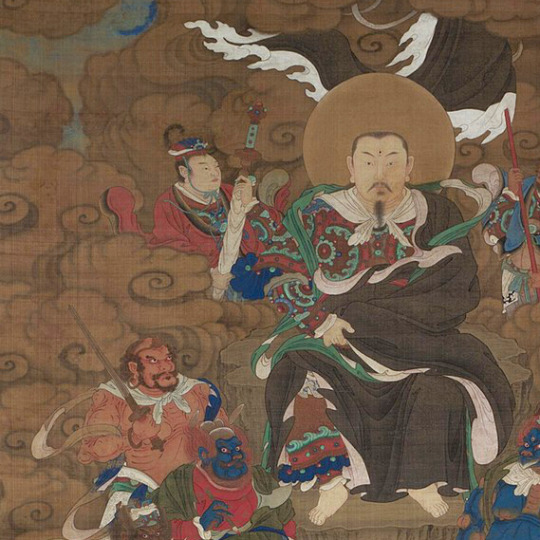
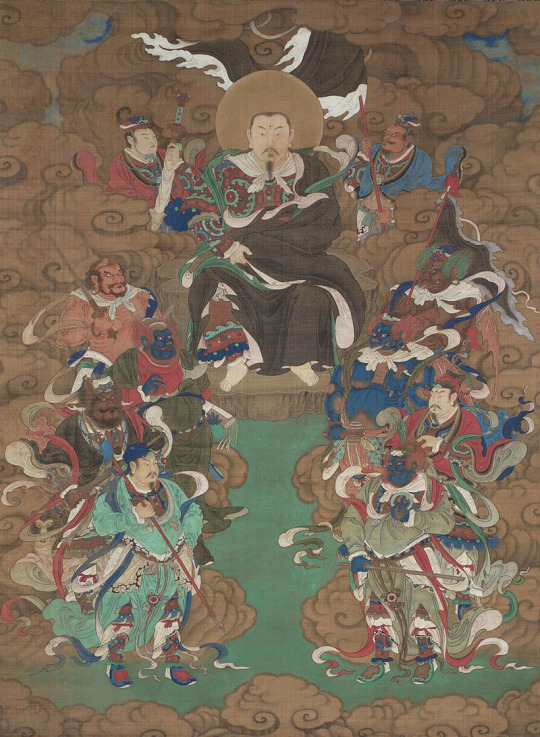
Ming Jian as seen in the Ming Period Painting of Zhenwu (Perfected Warrior) as Supreme Emperor of Dark Heaven (Xuantian Shangdi), early 15th century. Note the angular Jian with dish guard his xxx is carrying in the lower left corner. This style of “V” shaped tip and disk guard were common during the Ming dynasty.
Source: Cornell University, Johnson Museum of Art
#zhongguojianfa#jianfa#historicalswordsmanship#chineseswordsmanship#swordsmanship#chineseswordfighting#ukchineseswordfighting#swordfightingschool#swordfightingskills#swordfighting#chineseswordplay#swordplay#duanbing#swordwork#chineseswordwork#swords#sword#daoistswordarts#chineseswordart#swordarts#swordart#daoistswordsman#daoistsword#wudangjian#wudangsword#chinesemartialart#chinesemartialarts#中國劍法#劍法#劍
9 notes
·
View notes
Text
Traditional Chinese medicine for the treatment of chronic heart failure
According to traditional Chinese medicine (TCM), chronic heart failure is characterized by a deficiency in heart-kidney yang. This condition often aligns with New York Heart Association (NYHA) classes III and IV. Traditional TCM treatments for chronic heart failure focus on warming and tonifying kidney yang, along with herbal compositions that promote blood circulation and disperse blood stasis. Classic and folk prescriptions like Zhenwu decoction, Bushen Huoxue decoction, Shenfu decoction, Sini decoction, and Qili Qiangxin capsule are commonly used for chronic heart failure treatment.
Chronic heart failure is a condition where the heart becomes weakened and unable to pump blood efficiently. It often leads to symptoms such as shortness of breath, fatigue, and fluid retention. While Western medicine has made significant advancements in managing this condition, TCM offers a different perspective and treatment options.
One key aspect of TCM is its emphasis on individualized diagnosis and treatment. In TCM, each patient is seen as unique with specific imbalances in their body, which are believed to be the root cause of their condition. By addressing these imbalances, TCM aims to restore harmony within the body and promote overall well-being.
Herbal medicine is a fundamental component of TCM, and several herbs have been studied for their potential benefits in treating chronic heart failure. For example, Danshen, a herb commonly used in TCM, has shown promising results in improving heart function and reducing symptoms in patients with heart failure. Another herb, Hawthorn, has been found to enhance cardiac function and improve exercise tolerance. The chronic heart failure Chinese medicine Qiliqiangxin can enhance myocardial contractility, improve the pumping efficiency of the heart, improve cardiovascular function, and help to treat heart diseases such as cardiac insufficiency.
TCM also incorporates acupuncture, a practice where thin needles are inserted into specific points on the body. Acupuncture has been shown to have various effects on the cardiovascular system, including regulating heart rate and blood pressure. It can also help reduce inflammation and promote blood circulation, which is crucial for patients with heart failure.
Furthermore, TCM places great importance on lifestyle modifications and dietary changes. Practitioners often advise patients to follow a heart-healthy diet, which includes reducing sodium intake, consuming more fruits and vegetables, and avoiding processed foods. Regular physical activity, such as Tai Chi or Qi Gong, may also be recommended to improve cardiovascular health.
While TCM shows promise in the treatment of chronic heart failure, it's crucial to highlight the importance of an integrative approach. TCM should not replace Western medicine but rather be used as a complementary therapy alongside it. It's essential for patients to work closely with their healthcare providers and inform them of any TCM treatments they are undergoing.
Traditional Chinese medicine offers a unique and holistic approach to the treatment of chronic heart failure. Through individualized diagnosis, herbal medicine, acupuncture, and lifestyle modifications, TCM aims to restore balance within the body and improve patients' quality of life. However, it's important to remember that TCM should be used in conjunction with Western medicine for the best outcomes. If you or a loved one has chronic heart failure, consider discussing the potential benefits of TCM with your healthcare provider.
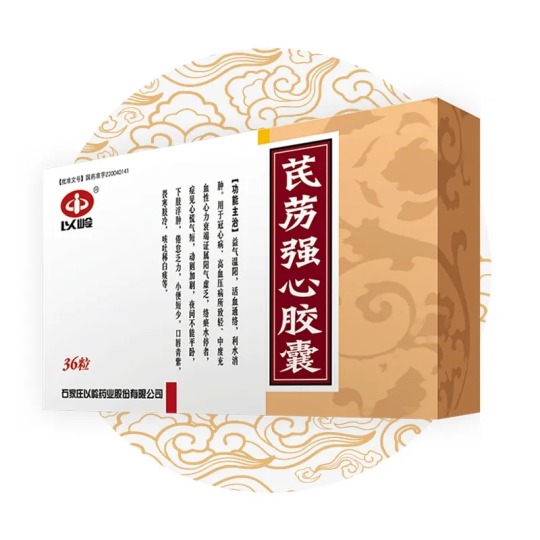
0 notes
Link
0 notes
Text
Mount Wudang, Kublai Khan, Multiculturalism and Advanced Leifa
Ye 葉 Family Taoist Lineage: Part 3
Ye Fashan, this groundbreaking reformer of family practice, sealed the fate of the Ye Taoist lineage for centuries by connecting it with the Shangqing school (上淸). In his descendants, Shangqing identity is already firmly established. This core identity persists, despite further metamorphoses of the lineage, reflecting the evolution of the Taoism…
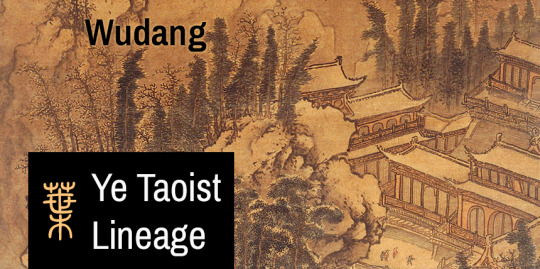
View On WordPress
Part 1, Part 2
#ancient China#Chinese mythology#genealogy#Kublai Khan#Leifa#Maoshan#Qingwei#Shangqing#Taoism#Taoist magic#thunder rites#Wudang#Yuan dynasty#Zhenwu#Taoist immortal#taoism#taoist#song dynasty#tang dynasty#yuan dynasty#Taoist sword#Taoist sorcery#Maoshan school#茅山#Duke of Ye#上清派#天師道#Tianshi dao#daoism#daoist
4 notes
·
View notes
Text
Baji Youlong
Ming Duoduo, I admire you. She forced herself to be calm, and her tone was quite relaxed. "The poisonous incense of my funeral door is probably useless in front of you." In the field of martial arts, I have to of the three talents? "Lady Liu, you have no chance," said the middle-aged man with his sword. "You can rest assured that I will be able to get my capital back." Lady Liu was no longer timid. "If you're lucky, you should." You can earn one. "Maybe you really have the determination to die." Lao Dao has a pretty good idea that it is not difficult for a person who deliberately fights to the death to fight to the death of the other party. The three of them were one to one, and no one could beat Mrs. Liu. Mrs. Ben doesn't care about life or death. "When people die, there is nothing left." "People will die sooner or later. There is not much difference between living for a day and living for a year." "In fact, you have no reason to fight with us." "You are forcing me to die. In the past, this lady was a friend of the five sons of Zhongzhou!"! One of you is not worth half to shelter. The little brute of money forced me to be a friend who had done my best for you, and the poet girl was killed and wounded, and could not get any benefit from you. Friends, if you can really rebuild the mixed stew palace, it should be said that it is God's will; it is not the luck that you have worked hard to get. This pass person is like today. If I don't die, I will lobby all the heroes in the world, and the General Assembly will be a mess of the palace, and I will be irreconcilable with you. "It's not fair for you to say that, Mrs. Liu." Lane tone a soft, aluminium coated steel tube ,side impact door beams, "Jing Hong swordsman and you are the same, the same for this." Can you blame the palace for sheltering him when the people of the palace come and harass him? "I know that you think that my men have been killed and wounded by working for you, and that I am no longer useful." So in order to get the support of Zhenwu Garden, he sacrificed me to shelter the little beast. But you're missing two important things. Reality. "What are two important facts?" "First, the little brute, those friends of Zhenwu Garden, have been scared shitless by the Baji Youlong, and are against the Baji Youlong." People, Jianghu friends know that it must not be a good thing. How dare they stand up for Zhenwu Garden and be spurned by others? So you can't get it again. With the support of friends from Zhenwu. First, your enemy of life and death is still elusive to track your whereabouts, you rebuild the palace of chaos. Wishful thinking, hit a wrong slot, your life and death is still uncertain. Abandon my top friends and turn into you. Threatening enemies, if you are not foolish, you are short-sighted and ignorant. If I am willing to cooperate with Yang Yiyuan, do you think The result? "You.." "Are you confident that you can trap me?" Lao Dao's face gradually o tone a soft, "as long as the little beast to me, I am still your friend." Friend. "People can't be handed over to you." Lao Dao said in a deep grove was the outer courtyard of Guanhou Jingshi District. Wall, as long as you jump over the wall and go out, you can stay away from the dangerous situation of Yuxuguan. Liu Biao took the lead and rushed into the small peach grove, followed by the startled swordsman. Behind the figure scurrying, is the night eagle. Why are you here? Jing Hong Chuang Ke crouched down and looked back alertly to see if Mrs. Liu was hiding in a tree. Here we go. As soon as Liu Biao hits the hand type,Precision steel tubes, sweeps to the courtyard wall, the status low person explores the way in front, Liu Biao plays the role of the attendant to be quite dutiful. cbiesautomotive.com
0 notes
Link
Selama Dinasti Utara dan Selatan, ada seorang pemuda bernama Zong Que (Hanzi: 宗悫, Pinyin: Zōng què). Ia lahir di Nieyang, Nanyang (nama daerah kuno, yang terletak di timur laut Kabupaten Deng, Provinsi Henan saat ini). Sejak dia masih kecil, dia mengikuti ayah dan pamannya untuk berlatih seni bela diri dan tinju. Dia memiliki cita-cita yang tinggi sejak usia dini. Pamannya, Zong Bing (Hanzi: 宗炳, Pinyin: Zōng bǐng), adalah orang yang sangat terpelajar. Dia pernah bertanya kepada Zong Que, “Apa ambisimu ketika kamu dewasa?” Zong Que menjawab: “Saya ingin mengendarai angin dan memecah ombak, mengukir karir yang bagus.” Zong Bing sangat mengagumi anak itu dan berkata, “Kamu pasti akan melakukan hal-hal hebat di masa depan.” Di masa kecil Zong Que, negara dalam keadaan damai, masyarakat relatif stabil, dan kebanyakan orang meninggalkan seni bela diri dan belajar sastra, dan ingin mendapatkan posisi setengah resmi melalui studi sastra. Tapi Zong Que menyukai seni bela diri, dan penduduk desa menganggap dia tidak berharga dan memandang rendah dirinya. Suatu hari, itu adalah hari pernikahan saudaranya, dan keluarga itu penuh dengan tamu dan suasananya sangat meriah. Lebih dari selusin pencuri juga mengambil kesempatan untuk berpura-pura menjadi tamu dan masuk. Sama seperti orang-orang datang dan pergi di ruang tamu di depan mereka, minum dan memberi selamat, kelompok pencuri ini telah menyelinap ke gudang keluarga Zong dan merampok mereka. Seorang pembantu rumah tangga pergi ke gudang untuk mengambil sesuatu, menemukan pencurinya, dan berlari ke ruang tamu sambil berteriak keras. Untuk sesaat, semua orang di ruang tamu tercengang, tidak tahu harus berbuat apa. Zong Que bersikap tenang, mencabut pedangnya, dan langsung pergi ke gudang. Ketika pencuri melihat seseorang datang, mereka mengancam Zong Que dengan pedang dan tombak mereka, tidak membiarkannya bergerak maju. Zong Que tidak menunjukkan rasa takut sedikitpun, dia mengangkat pedangnya dan menikam pencuri itu, dan keluarganya segera membantunya. Melihat situasinya tidak baik, pencuri itu menjatuhkan barang curiannya dan segera melarikan diri. Ketika para tamu melihat pencuri itu diusir, mereka memuji Zong Que karena cerdas, berani, dan muda. Pada tahun 446 M, Kaisar Wen dari Song (Hanzi: 南朝刘宋, Pinyin: Náncháo liú sòng) mengirim Jiaozhou Lashi Tanhe untuk menyerang Linyi (nama negara kuno) Wang Fanyangmai. Saat itu Zong Que sudah menjadi seorang pemuda yang heroik, dan dia mengajukan diri untuk bergabung dalam perang. Kaisar Wen dari Song menghargai keberaniannya, menyetujui permintaannya untuk bergabung dalam perang, dan menamainya Jenderal Zhenwu. Saat berperang, tentara Lin Yi melepaskan gajah terlatih. Sekelompok gajah membentangkan kuku mereka dan bergegas menuju pasukan Song. Pasukan Song tumbang satu demi satu. Pada saat ini, Zong Que menawarkan sebuah rencana dan berkata, “Saya mendengar bahwa singa dapat menekan semua binatang, dan kita dapat menggunakan singa palsu untuk menekan gajah.” Saran Zong Que diterima. Pasukan Song membuat banyak singa palsu. Kedua pasukan saling berhadapan, dan musuh melepaskan seekor gajah. Pasukan Song meluncurkan singa palsu. Ketika gajah melihat singa, dia ketakutan dan melarikan diri ke segala arah. Zong Que tidak hanya banyak akal, tetapi juga berpikiran luas. Rekan sedesanya Yuye, keluarga kaya, sering mengadakan pesta. Saat Zong Que menjadi tamu di rumah Yu, Yu Ye berkata, “Zong Que adalah seorang tentara, dia terbiasa dengan makanan kasar, jadi perlakukan dia dengan teh kasar dan nasi ringan.” Zong Que tidak mempermasalahkan hal ini. Kemudian, Zong Que menjadi gubernur Yuzhou, dan Yuye menjabat sebagai menteri utama (pejabat kepala gubernur) di bawahnya. Zong Que memperlakukannya dengan sangat baik dan tidak pernah menyebutkan masa lalu. Reputasi Zong Que semakin tinggi, dan pengaruhnya semakin besar. Pada tahun 459 M, Raja Liu Dan dari Jingling memberontak di Guangling (sekarang Yangzhou, Jiangsu), dengan kedok nama Zong Que, dia menipu bawahannya dan berkata, “Zong Que mendukungku.” . Ketika istana kekaisaran mengirim pasukan untuk menyerang, Zong Que juga berada di tentara. Dia berkeliling kota sendirian dan berteriak: “Saya Zong Que!” Para pemberontak melihat bahwa Zong Que datang untuk menaklukkan, dan moral mereka runtuh. Zong Que dengan cepat memadamkan pemberontakan. Karena prestasinya yang luar biasa, Zong Que dipromosikan menjadi jenderal penjaga kiri dan diberi nama Marquis of Taoyang. Semangatnya yang ambisius dan pekerja keras telah memenangkan rasa hormat dari dunia, dan semua generasi orang dengan cita-cita luhur telah mengambil dia sebagai contoh. Perkataa Zong Que : Mengendarai angin dan memecah ombak, kini menjadi pepatah terkenal. Terima kasih telah membaca, silahkan kunjungi Tionghoa Indonesia untuk artikel-artikel lain yang lebih menarik.
0 notes
Text
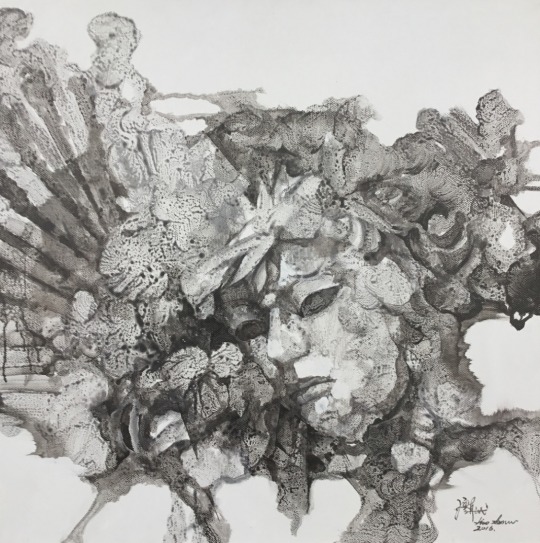
Liao Zhenwu (Chinese, b. 1964)
Tales, 2016
Acrylic on canvas
65 notes
·
View notes
Note
🖊 Zhenwu is the beat swimmer in the family and the de facto life guard of the village
Send me 🖊 and a headcanon for one of my OCs and I'll tell you what I think!
Honestly I think the title of best swimmer goes to his daughter Hai on his side of the family. On Fei's side it's Dasao. Basically all River Tenders do basically keep a lookout for anyone who's fallen in and might have difficulty swimming like young children. But since the water is so calm and nearly everyone in the village can swim before they can walk, it's rarely a worry for Shambhala's residents.
0 notes
Text
Chapter 18: What a Swine!
-A few pages into the chapter, and I found the first hook to go on a giant tangent: according to Gao Cai, Gao Village is located in the Kingdom of Qoco. I have no idea why Yu translated it as such, since the original Chinese name——Wusi Zang(乌斯藏, a transliteration of dbus gtsang) sounds nothing like that, but in short, it's the Ming dynasty name for Tibet.

-However, a quick glance at this map would show you that the real Xuanzang didn't cross Tibet during his journey; rather, he went the long way around the Himalayas, travelling on the Central Asian Silk Road. In the Ming dynasty, if you wanna go to India, you could actually take the route through the Himalayas and Nepal, but it wasn't there in the Tang dynasty (because there were a couple of hostile kingdoms in the way; Tuyuhun, Tubo, etc.)
-Sidenote, I absolutely love how JTTW '86 adapted this chapter, with SWK getting his flirt on and the legendary "Pigsy Carrying His Bride" sequence that had made its way into many subsequence adaptations.

-JTTW Research had written pretty comprehensively about Pigsy's origins, from the Daoist deity Marshal Canopy to his ties with Marici, an import deity with a boar mount who's also associated with the Dipper Constellation. As such, I only had one tidbit to add about possible inspirations for his character in folklore that predated the above.
-The earliest tale about a lusty pig demon could be found in the Tang dynasty Xuan Guai Lu(玄怪录). Guo Yuanzhen, a historical general during the reign of Gaozong and Wu Zetian, came across a mansion in his youth during travel. The whole place was lavishly decorated, as if preparing for a wedding banquet, but eeriely empty save for one crying woman.
-Turned out, she was the unwitting soon-to-be bride of a god called "General Wu"(乌将军), who demanded a beauty as his wife every year from the locals, and because they would pay a hefty sum to "buy" said bride, her own father sold her out to be this year's sacrifice. Furious, Guo disguised himself as a guest, pretended to offer General Wu some venison, then cut off his hand with the meat knife.
-Wounded, the General fled, and his severed limb turned into a pig's hoof once the sun came out. Soon, the bride's family and village elders came to the manor, ready to collect her body for the funeral, and were so freaked out by what Guo did that they were ready to sacrifice him to General Wu too, since the "god" was known to summon storm and hails whenever he didn't get his bride.
-Guo scolded them for being so damn guillible because no real gods would demand human sacrifices or, y'know, have pig hooves as hands, before gathering the young men of the villages and following the trail of blood to the pig demon's abode, where they proceeded to smoke it out and kill it with an assortment of arrows and farming tools.
-The woman, after calling out her terrible parents, pledged herself to Guo and became one of his wives, and all was well.
-Honestly, Pigsy's evolution from his folklore origins to JTTW Zaju to JTTW novel seemed to be one in which he became increasingly sympathetic; from basically being a more lusty version of Guanyin's goldfish, to an opportunistic kidnapper who took advantage of a pair of star-crossed lovers' family feud, to an ex-deity turned reformed demon who kinda got screwed over by his in-laws.
-Final note: Pigsy bragged that even if they could get the "Monster-Routing Patriarch" to come down from the Nine Heaven and exorcise him, he could still claim to be an old buddy of the guy. Which…wasn't wrong, considering that "Monster-Routing Patriarch" was the title of Emperor Zhenwu, Lord of the North, who was worshipped alongside Marshal Canopy as one of the Four Saints of the North Pole.
@journeythroughjourneytothewest
63 notes
·
View notes
